"I'm here to learn, to make things happen"
“To explore strange new worlds, to seek out new life and new civilisations”: that was the mission of the Starship Enterprise in Star Trek. And it seems a galaxy away from the more down-to-earth attitude in Swiss engineering. It conjures up notions of unlimited opportunities, big ideas and budgets of the kind that Thomas Zurbuchen enjoyed as Head of Research at NASA.
Zurbuchen came to ETH Zurich to give new momentum to ETH I Space, which was launched at the end of 2022, as well as to its space-related activities. Doing so successfully means establishing a network and dialogue with all departments at ETH Zurich that have already pursued pioneering research in this area.
Pioneering the future of space exploration
Zurbuchen explains that the space sector is booming like never before: “We are seeing 10% growth every year.” For Switzerland, he sees an incredible amount of potential in space research, as this area specifically calls for the kind of “deep tech” engineering at which the country excels, with its precision, pioneering spirit and cutting-edge technology. Zurbuchen believes that ETH Zurich is well placed to take advantage of this potential: “We are not starting from zero. The future is already there, we just have to scale it.”
The list of ETH projects that have been blasted into space is indeed impressive, from the Large Interferometer for Exoplanets, a mission led by ETH Zurich for researching exoplanets, to its involvement in developing one of the most important space research instruments – the James Webb Space Telescope. The university also plays a leading role in the use of satellite data for environmental research.
Zurbuchen wants to combine the existing activities in the newly founded entity to make them more effective. He knows how to bring people together and create synergies, particularly in terms of education, research and entrepreneurship. Almost immediately after arriving at ETH Zurich, he set up a team consisting of four departments and the Rectorate to start Switzerland’s first Master’s degree programme in space systems next summer in 2024.
Embracing entrepreneurial spirit
It is obvious that Zurbuchen values entrepreneurial dynamism. The explosive growth in the sector is due in large part to the increasing number of commercial programmes targeting space. Zurbuchen wants to strengthen this pioneering spirit in Switzerland too, as he sees the private sector as being much better suited to developing new innovations than the government. Arguably the best example of this is Elon Musk and his audacious rocket experiments. According to Zurbuchen, it is this impetuousness of youth that is so urgently needed. He wants to turn Switzerland into a home for bright young minds who want to conquer space.
Luxembourg is another country that has successfully positioned itself in recent years as a hotspot for exploring commodities from beyond the Earth. Zurbuchen believes we can take this tiny country’s success in creating new markets as an example, although he sees Switzerland’s strengths as being concentrated more in research. The focus now should be on launching more interesting sensors and high-quality research approaches into space.
Establish a common vision for the civil exploration of outer space
But how does he view the ethical conditions of more profit-oriented organisations expanding into the final frontier? Zurbuchen mentions the Artemis Accords, which aim to govern the research and use of the moon at international level. To quote the accords: “to establish a common vision via a practical set of principles [... for] the civil exploration and use of outer space.” Zurbuchen underlines this and emphasises the importance of international cooperation, even if it is not easy: “We are going in the right direction.” And who knows? Maybe Switzerland will become one of the big players, given its experience in both high-tech sensors and crafting international agreements.
Zurbuchen is refreshingly open about the uncertainty surrounding how exactly this metaphorical rocket will be launched for Switzerland: “I’m here to learn, to make things happen.” It is easy to believe Zurbuchen when he says his outsider status is a strength rather than a weakness. After all, one of the reasons for his success in the US was that he was a foreigner who first had to gain an understanding of the cultural differences. Now the story is repeating itself in reverse.
